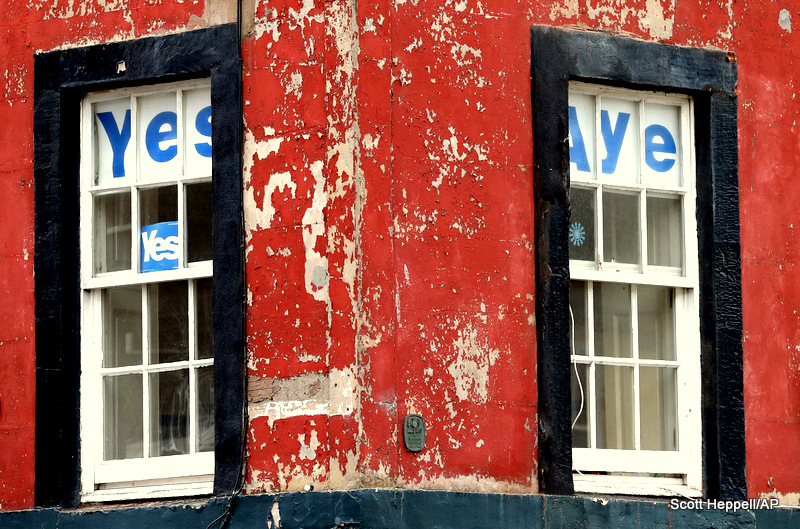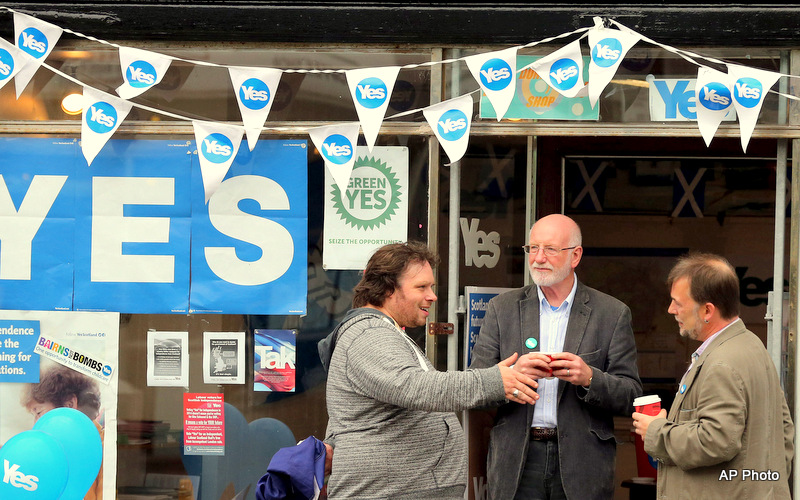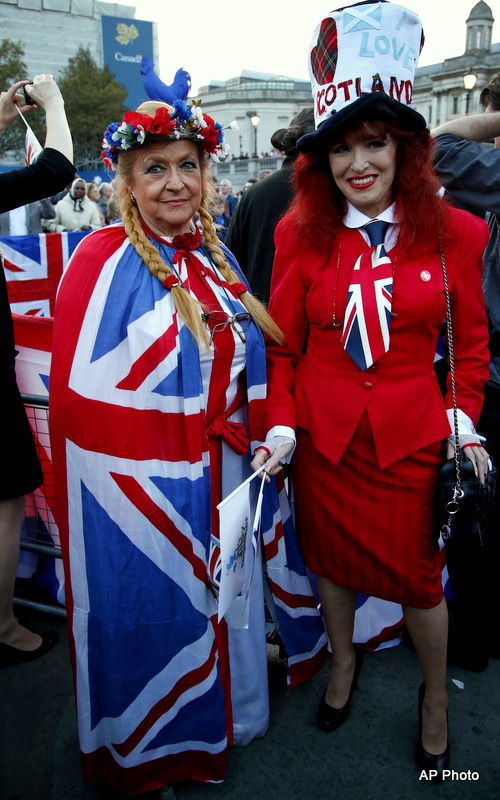 GLASGOW, Scotland — On Sept. 18, some 4.2 million people in Scotland will cast their votes in arguably the most important referendum ever to be held in the United Kingdom. Indeed, these are momentous times in Britain, and if Scotland votes Yes for separation next week the nation will become the world’s newest state in what would be a seismic political moment.
GLASGOW, Scotland — On Sept. 18, some 4.2 million people in Scotland will cast their votes in arguably the most important referendum ever to be held in the United Kingdom. Indeed, these are momentous times in Britain, and if Scotland votes Yes for separation next week the nation will become the world’s newest state in what would be a seismic political moment.
Currently, the U.K. is a sovereign state comprising Scotland, England, Wales and Northern Ireland. It was formed by the Act of Union in 1707, a treaty signed by the nations of Scotland and England and which led to the rise of the U.K. as a major world power and the onset of the British Empire.
For the past 80 years Scottish nationalists have argued that Scotland should be independent again, a belief increasingly fuelled over the last three decades by the dominance of center and right wing political parties in the government at Westminster, London. This neoliberal ideology conflicts with the center-left political culture that prevails in Scotland.
This tension was brought into sharp focus during Margaret Thatcher’s tenure as a Conservative prime minister in the U.K., which began in 1979, and by right wing policies by successive Conservative governments which devastated Scotland’s industrial heartlands, leading to high unemployment and social decay. To this day, many people in Scotland have not forgiven the late Lady Thatcher, and the Conservative Party remains anathema to the majority of Scots voters.
When Labour came to power in 1997, Tony Blair’s government agreed to devolve some powers from Westminster to Scotland with the creation of a Scottish Parliament in the nation’s capital, Edinburgh. Following the Act of Union, Scotland retained its own churches and judicial and education systems, and devolution through the Scotland Act 1998 was supposed to end calls for independence. This legislation created the Scottish Parliament and set out its legislative powers, including control over issues such as education and health, while Westminster retained control of foreign policy, welfare, and immigration.
This act was supposed to appease those who wanted a degree of autonomy for Scotland and to quell nationalist sentiments, but devolution has failed in that respect. Indeed, over the last 15 years the demand for independence has increased greatly, largely due to rising economic inequality in the U.K. Scotland has traditionally voted Labour, but many supporters feel their party has drifted to the right and the Scottish National Party, adopting a center-left stance, has gained credibility after taking power.
The SNP first came to power at the Scottish Parliament in 2007, then again in 2011, when the nationalists secured an astonishing political victory to secure a majority and pave the way for next week’s historic referendum.
So, the question Scotland’s electorate must answer Yes or No to next Thursday is: “Should Scotland be an independent country?”
At time of writing, the Yes and Better Together (No) campaigns were neck and neck in the polls, with the former having slashed the latter’s lead by an astonishing 22 points since the beginning of August. It has been an exhilarating political contest and most commentators say the result is now too close to call, with the very real possibility that Scotland could leave the U.K.
The Yes campaign
 The Yes campaign is a left-of-center political movement spearheaded by the SNP but comprising of — among others — nationalists, socialists and greens who advocate a move away from the neoliberalism of the Conservatives and Labour to the social democratic politics of Scandinavian countries such as Norway, Sweden, and Denmark.
The Yes campaign is a left-of-center political movement spearheaded by the SNP but comprising of — among others — nationalists, socialists and greens who advocate a move away from the neoliberalism of the Conservatives and Labour to the social democratic politics of Scandinavian countries such as Norway, Sweden, and Denmark.
What has been remarkable about Yes is its highly effective grassroots campaign over the past two years that’s seen thousands of ordinary people – many of whom have never before been involved in politics – take to the streets of Scotland’s cities, towns, and villages to push the case for separation.
On Sept. 4, MintPress News visited Scotland’s largest city, Glasgow, and interviewed Yes campaigners who had gathered for a rally in support of the SNP. The event was held to mark the 10th anniversary of Alex Salmond’s leadership of the SNP alongside his deputy, Nicola Sturgeon. First Minister Salmond and Sturgeon went on a walkabout in the city and were joined by around 150 supporters carrying Saltires, colorful balloons, and dozens of blue and white placards emblazoned with the word, “YES.”
There was a carnival atmosphere and Yes supporters included Morgan Horn, an 18-year-old student from Glasgow who is a member of Generation Yes (a youth movement campaigning for a Yes vote).
“This will be the first time I’ve voted in an election. I’m voting yes because I believe in social justice and democracy,” Horn told MintPress, adding, “I don’t think Westminster brings that for Scotland because it has totally different views on politics.”
Horn — who said she feels the referendum offers her the chance to change Scottish society for the better — also expressed fears that university tuition fees could be introduced to Scotland in the event of a No vote, and that the National Health Service could face greater privatization.
Horn’s views were shared by SNP Councillor Alison Thewliss, who brought her 10-month-old daughter Kirsty to the rally. Thewliss has been a member of the SNP for 14 years and said she was voting Yes in the hope an independent Scotland would offer children better opportunities.
“My other child is four. I go door to door speaking to people and asking how they’re feeling, and what their concerns are. I’ve been a councillor for seven years. The debate has engaged people in a remarkable way, as there are people volunteering to help who’ve never been involved in politics before. It has been quite incredible,” she told MintPress.
Social justice has been one of the main areas of debate, with both sides claiming they would make Scotland – parts of which are riven with poverty – a much fairer place.
The other main issues concerning voters include the economy, currency, pensions, national identity, nuclear weapons, defense, future oil and gas reserves, and the National Health Service, which provides free health care to the U.K.’s population.
Better Together
Later that afternoon, the aforementioned issues were discussed outside the Gallery of Modern Art in Glasgow, where Better Together campaigners gathered to hear a high profile Labour politician state his case for Scotland remaining as part of the U.K.
 Jim Murphy is Labour MP for East Renfrewshire and shadow secretary of state for international development at Westminster, and he campaigns for Better Together, the umbrella group promoting the U.K. supported by the three main parties at Westminster — Conservative, Labour and Liberal-Democrats.
Jim Murphy is Labour MP for East Renfrewshire and shadow secretary of state for international development at Westminster, and he campaigns for Better Together, the umbrella group promoting the U.K. supported by the three main parties at Westminster — Conservative, Labour and Liberal-Democrats.
He was on a tour of Scotland dubbed “100 towns in 100 days,” an exhausting personal journey undertaken as an attempt to persuade people to vote No. Murphy – who briefly suspended his campaign after being egged in the Fife town of Kirkcaldy – adopted traditional soap box politics, standing atop a red plastic crate, microphone in hand, as he told his audience that Labour is the only party that can deliver social justice for Scotland and the rest of the U.K.
Murphy said, “Labour, Tory and Lib-Dems are working together on this one issue, and I know that’s tough for Labour supporters. But the fact is that these three parties, who agree on almost nothing else, have come together on this one issue. Alex Salmond wants to tell you: Vote for independence and a perfect Scotland will come with a cross in a box.”
Murphy pointed out that people in Scotland receive more spending per capita for public services than the rest of the U.K. — about $1,950 each year, adding that the country contributes over $86 billion to the U.K. treasury annually but receives $106 billion — a difference of roughly £12 billion.
“Those people campaigning for independence have got to tell us, where will that £12 billion black hole come from?” he said.
His comments played well with the crowd, which included Gary Kirkmichael from Glasgow, who said he would definitely vote No. “I just think a No is the best thing for Scotland,” Kirkmichael told MintPress.
“It’s not that I disagree with Yes, it is just that I am happy with my life just now,” he continued. “I work overseas, offshore, as a rig electrician. I’ve never been active in politics but there is something here I care about which is under threat, so that’s why I came today.”
Patricia Cossans from Dundee said she was also voting No because the SNP had failed to confirm which currency an independent Scotland would use — one of the most contentious issues of the debate, as the three Westminster parties have said they oppose formally sharing sterling with an independent Scotland.
“I feel the SNP don’t listen about the currency issue,” Cossans continued. “I also think it was a disgrace to Scotland that Mr. Salmond was rubbing shoulders with Putin. There are so many things. Mr. Salmond angers me because he’s really not thinking this through. He is pulling us away from something we have had for 300-odd years. It’s just a power trip he’s on.”
Scotland is now a divided nation, and the stakes in the Sept. 18 referendum are incredibly high. Better Together’s fears were outlined on Wednesday by former U.K. Prime Minister John Major, who told the BBC’s Today program:
“If Scotland voted to leave it would be disastrous for the whole of the U.K. Firstly, because Trident is in Scotland, our defense would be imminently weakened. There are a lot of Scots in the British army. We would lose Trident, which has been our protection for a long time. Our role in NATO would be reduced. Our relations consequently with the U.S. would be damaged. The United Kingdom would be weaker in every international body it attends. It would certainly be weaker in the EU in the forthcoming negotiations. We would lose our seat at the top table in the U.N.”
On Sept. 18, though, voters will be the ones to decide whether Scotland breaks away or stays.

